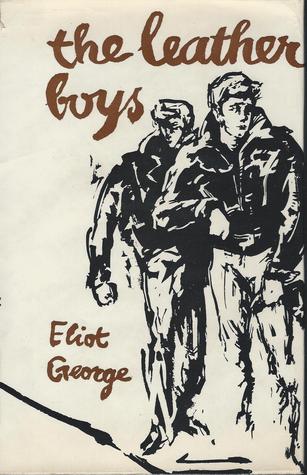Inspiring Older Readers
 posted on 13 Mar 2018
posted on 13 Mar 2018
The Leather Boys by Eliot George
This story of a blossoming gay romance between two working class teenage biker boys was published in 1961 – three or four years after Wolfenden had recommended decriminalisation of homosexual activities but a full six years before any legislation came into force. It’s not surprising, therefore, that the book has something of a cult status within the LGBT community and also accounts for why the publishers thought it necessary to give the author a pseudonym.
Eliot George is not a very imaginative pen name I suppose but inverting the name of a 19th century giant of novel writing who had to masquerade under a man’s name in order to be taken seriously as a writer does make a point of sorts. The name hides the identity of the novelist Gillian Freeman, who at this point had published two or three novels under her own name and went on to write a whole lot more as well as a highly regarded study of written pornography called The Undergrowth of Literature. As you might expect from an author with serious credentials, this piece of storytelling is not only designed to provide a space for the gay voice but to tell a convincing tale of working class teenage life.
Dick and Reggie are 18 year olds who lead quite different lives – Dick is devoted to his ailing grandmother who has just been widowed and Reggie has succumbed to social pressures and has married unwisely to Dot, a girl he now despises – but they come together in the coffee-shop gang led by the volatile and vicious Les. The gang indulges in petty acts of vindictive vandalism that give both Dick and Reggie a thrill but it’s also clear that their activities are escalating towards the more openly criminal.
When Reggie finally leaves Dot, he moves in with Dick at the grandmother’s house and the two find themselves sleeping in the same bed. Their latent attraction to each other is triggered and so begins a tentative but very positive physical and emotional relationship. They even start planning a life together away from their narrow neighbourhood and Dick makes plans for them to join the merchant navy. Needing money to make their plans come true and for Reggie to pay off Dot, the two decide to pull off the robbery of a small cinema without telling Les or the rest of the gang what they are up to. This is a breach of gang etiquette that they know would bring down a swift reprisal if discovered but they decide to risk it.
Their plans are exposed by Dot in an act of guilty vindictiveness and despite the fact that the robbery of the cinema has to be aborted, Les and the gang extract a tragic price for their disloyalty.
The book was filmed in 1964 and directed by Sidney Furie and it’s easy to see why it would have appealed to a film-maker. The prose is very readable, direct and unadorned and there is no attempt to complicate or justify the relationship that develops between the boys – and mercifully no attempt to write any explicit sex scenes.
The touching diffidence between the central characters, the gentleness of their relationship, stands in stark contrast to the violence of the gang. But it’s also right and good that the boys are not depicted as angels or as stereotypically ‘gay’ – in fact the homosexuality which is central to the book is almost taken for granted and the story of two teenage boys looking to escape the limited boundaries of their lives is by far the more important and dominant theme.
I’m not suggesting The Leather Boys is a great, lost masterpiece but I am saying it is a brave and perceptive book that tried to take on issues that other writers preferred to skirt around. Gay working class protagonists who are at the centre of the action are difficult to find in contemporary literature of the time and those novels that did try and address the issue of homosexuality usually had a middle or upper-middle class cast of characters – think of Brideshead Revisited or Maurice, for example.
I think the book can still speak to teenagers today and I was glad to see that a 2014 paperback edition is available online for not very much.
Terry Potter
March 2018